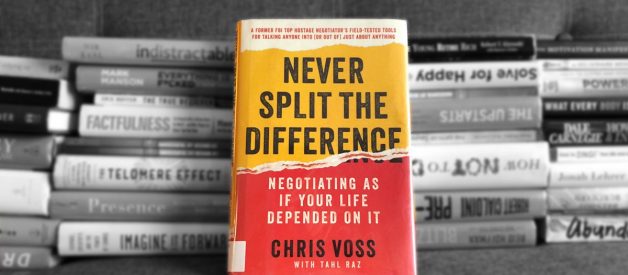The beauty of empathy is that it doesn?t demand that you agree with the other person?s ideas.
~ Chris Voss
Why The Old Ways Of Negotiating Don?t Work
Chris Voss teaches us that why most of the old-school negotiation tactics don?t work as well is because they ignore the actual human being doing the negotiating.
People are irrational, emotional and biased. It is what makes it human after all.
A successful negotiation is about being emotionally intelligent and empathetic to the other side.

The Power Of Active Listening
A successful negotiation starts with ?active listening?.
Before you can turn human emotions to your advantage, you need to make the other person feel HEARD and understood.
To do that, you need to become a master of ?active listening?.
It is the act of muting your own internal commentary and focusing 100% of your attention to what the other person is saying.
This is radically different to what you are used to doing in every day life, which is ?passive listening? ? hearing what you want to hear and filtering out the rest. Or, concentrating on formulating your answer while the other person is still talking, thus not really paying attention.
How To Use Mirroring To Win Someone Over
To demonstrate your superb listening skills, you make use of a tactic called ?mirroring? ? you reply using the last 3 or 4 words of what the other person said.
For example, if they say ?I cannot believe its going to be so unbelievably cold on Friday:, your reply starts with :Yeah, Friday is going to be unbelievably cold?? and then you continue with what you want to say.
By imitating their speech patterns you are signalling (on an emotional level) to the other person that you are not only hearing them, but you are similar to them.
This creates trust.
Trust wins negotiations!
How To Deploy ?Tactical Empathy?
You have made the other person feel heard, now it is time to level-up and make them feel understood.
You do that by employing ?tactical empathy?.
It is understanding someone else?s perspective and then vocalizing it, in order to get what YOU want.
You do that by what the author calls ?labeling? ? you actively listen to the other person and then you vocalize their emotion with a neutral third-person phrase such as:
- It seems like you?
- It looks like you?
- It sounds like you?
Getting To ?That?s Right?
Your goal as a successful negotiator is to actively listen, employ tactical empathy and use mirroring and labeling to get the other side to the magical two words ? ?that?s right?.
When you have summarized the other person?s words and emotions and you?ve earned a ?that?s right? from them, they are crediting you with seeing things their way. You have connected with them on an emotional level which totally transforms the negotiation environment.
Using Calibrated Questions For The Win
The next step is to use what the author calls ?calibrated questions?.
These are open-ended ?how? and ?what? questions for when you inevitably hear something you don?t like.
- ?How am I supposed to do that?? or
- ?What are we really trying to accomplish here??
This type of questions prompts for a longer answer.
They put the other person to work helping you solve your problem (magical!).
Your Turn Now
Successful negotiations are all about understanding that the emotions of the other person play a much bigger role than facts and logic.
By making them feel heard and understood you can diffuse any situation.
Read the full blog post here.


